20 Oct 3 Strategic SEO Insights & Tactical Advice for 2021 via @gregjarboe
For industry veterans, 2020 has been an “annus horribilis.”
Instead of sharing strategic insights with clients in face-to-face meetings and tactical advice with attendees at industry conferences, we’ve been limited to presenting advanced SEO concepts and techniques via Zoom.
We’ve failed to prevent a client from cutting their SEO budget at critical times this year.
And we haven’t persuaded that group of prospects that SEO services, training, or consulting still provide the best return on marketing investment (ROMI).
But, this is the time when we need to refocus our objectives before we double down on our efforts.
Allan Thygesen, President of the Americas at Google, recently wrote an article for Think with Google titled Rethink Ready: How to Prepare Your Business for What’s Next.
He said:
“2020 has been a year unlike any other. A pandemic that upended daily life and routines. Worldwide economic disruption. Universal uncertainty about exactly what comes next. We’re all traveling in truly uncharted territory.”
And it’s also worth reminding ourselves that Sowmya Subramanian, Director of Engineering for Search Ecosystem, wrote a post in the Official Google Webmaster Central Blog back in May titled Evaluating Page Experience for a Better Web.
She said:
“We recognize many site owners are rightfully placing their focus on responding to the effects of COVID-19. The ranking changes described in this post will not happen before next year, and we will provide at least six months’ notice before they’re rolled out.”
Well, “next year” is right around the corner.
And, SEO professionals have now had seven months to adjust to the “new normal.”
So, now is the time for all of us to reboot our SEO strategies to respond to the dramatic shifts in consumer intent caused by the pandemic as well as to prepare for Google’s Page Experience update in 2021.
There are three basic steps to this SEO process:
- Use Google Analytics and Search Console to evaluate your site’s current presence in Google.
- Conduct a new round of keyword research to find out what people are searching for today.
- Provide high-quality content on your pages to give visitors the information they’re looking for.
And here’s a spoiler alert:
SEO budgets are the last thing that should be cut, and advanced SEO services, training, and consulting still provide the best ROMI.
1. Use Google Analytics & Search Console to Evaluate Your Site’s Current Presence in Google
Now, telling SEO pros to use Google Analytics and Search Console to evaluate your site’s current presence in Google seems as unnecessary as reminding healthcare professionals to wash their hands and wear surgical face masks.
But SEO professionals have all been conducting triage since the World Health Organization (WHO) declared that the Novel Coronavirus Disease, COVID-19, was a pandemic on March 11, 2020.
So, we need to take the extra time to compare our site’s current presence in Google to last year, and competitive benchmarks, in order to set our strategic goals and marketing objectives for 2021.
And we should also take the sage advice of my old boss and mentor, William B. Ziff, Jr., who observed more than a generation ago, “We pay too much attention to events and not enough to trends.”
So, I’ll use the Google Analytics demo account as an example to show you what to look for.
As you may already know, the data in the Google Analytics demo account comes from the Google Merchandise Store, a typical ecommerce site that sells Google-branded merchandise.
We should start by comparing all the site’s traffic from March 1 through September 30, 2020, with the same seven months in 2019.
This allows us to avoid comparing data for February, which had 29 days this year, but only 28 last year.
As you can see in the chart below, the number of users to the site is down 11.7% and revenue is down 8.5%.
But, if you look at just the organic search channel, the number of users is down 23.0%, but revenue is down only 7.3%.
So, some SEO pros may want to focus on getting the level of organic search traffic back up 23.0% next year, but most of the executives they report to will be more focused on getting the amount of revenue back up 7.3%.
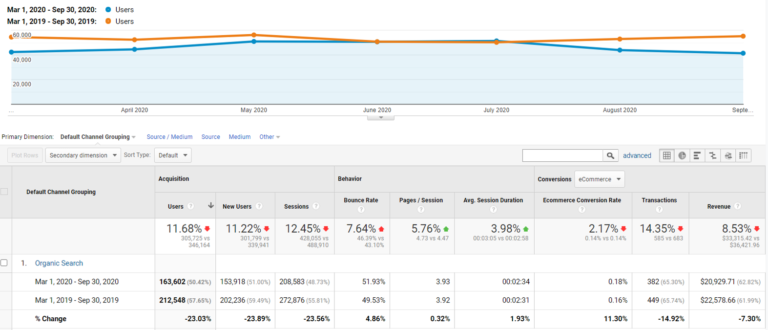

Next, let’s use benchmarking to find out how we are doing compared to our competition.
This provides valuable context, helping us to compare our data with aggregated industry data from other companies – at least the ones that share their data – and gain insight into trends occurring across our industry.
As you can see by looking at the data for organic search, the Google Merchandise Store was outperforming comparable sites in sessions and new users a year ago, but it’s underperforming these same competitors this year.
It will take courage to share this strategic insight with executives, but it may be the best way to make the business case for getting a bigger SEO budget in 2021 than you had in 2020.
It also begs the question: What is your competition doing that you aren’t?
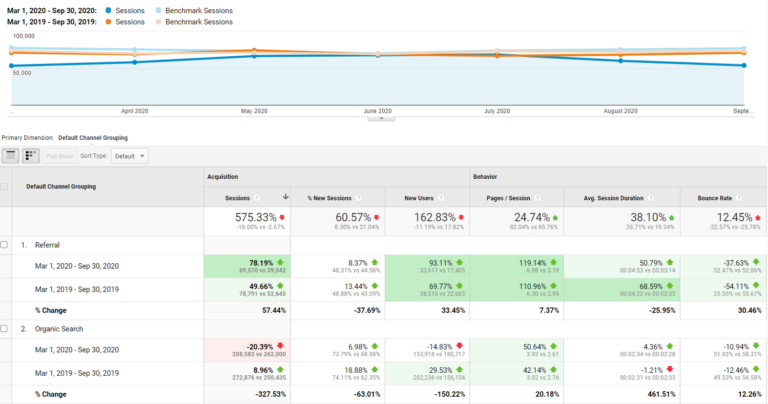

Now let’s look at Search Console data for the Google Analytics demo account, which started getting collected on May 24, 2019.
So, to compare apples to apples, you need to compare June 1 through September 30, 2020, to the same four-month period in 2019.
This shows us that clicks on the top 1,804 search terms are only down 0.6% even though impressions are down 5.1%.
And the click-through rate (CTR) is up 4.8% and the average position is now 22, which was 23 for the same period a year ago.
It’s also worth noting that the top two search terms in terms of clicks are “YouTube merchandise,” which is up 31.9%, and “YouTube merch,” which is up 15.3%.
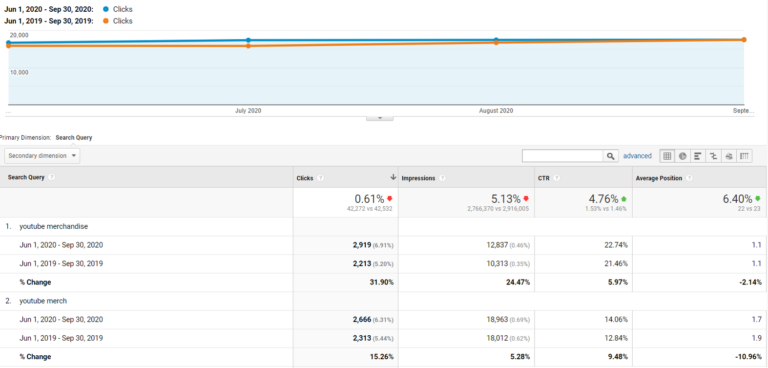

Then, let’s analyze the data for assisted conversions from October 1, 2019, through September 30, 2020.
We should focus on the data that shows organic search not only accounts for 38.1% of the last click conversion value, but also 48.2% of the assisted conversion value.
In fact, if we take a peek at the top conversion paths, then we’ll see that it’s “Organic search” followed by “Direct.”
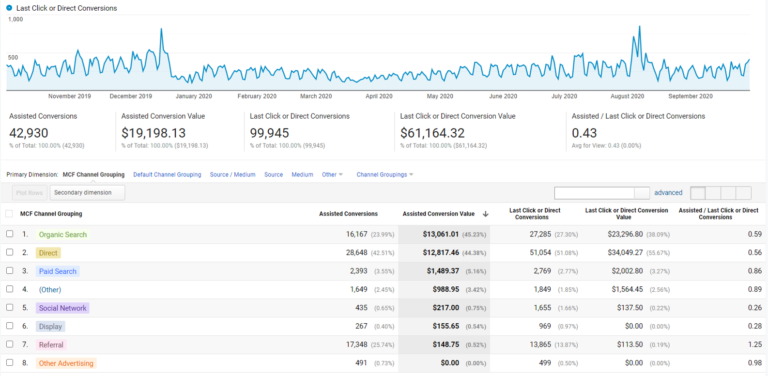

So, how do SEO pros turn these strategic insights into a persuasive business case for increasing their budget in 2021?
The answer is to work backward from the formula for calculating the Return on Marketing Investment.
ROMI = [Incremental Revenue Attributable to Marketing ($) * Contribution Margin (%) – Marketing Spending ($)] / Marketing Spending ($).
So, for argument’s sake, let’s say the profit margin on the items sold in the Google Merchandise Store is 60% and the cost of goods sold is 40%.
Then, the $61,160 in incremental revenue attributable to marketing multiplied by 60% yields a profit of $36,696.
So, if we spent $12,232 on marketing, then we would have generated $2 in profit for every $1 that was spent on marketing.
We would be heroes.
This may seem like a modest marketing budget, but it would be a profitable one.
And, based on its share of conversion value, 58.5% of this modest marketing budget should have been spent on SEO.
That’s why this is the last budget that should be cut.
Now, different websites in different industry verticals with different goals and different competitors will have different marketing budgets.
But, don’t be surprised if you do similar calculations and discover that the lion’s share of those budgets should be spent on SEO, too.
2. Conduct a New Round of Keyword Research to Find out What People Are Searching for Today
The second step in this process is to conduct a new round of keyword research to find out what people are searching for today.
I’ve already written an article about this, 7 Google Tools to Use When Conducting Keyword Research Today.
Since then, Google has introduced an eighth tool that SEO professionals should use to evaluate their retail websites in an ever-changing environment.
It’s called Grow My Store.
Although it doesn’t provide keyword suggestions, it does let you explore rising industry trends and compare your business to other retailers.
For example, I entered the URL for the Google Merchandise Store and was happy to see that the website’s average score across the apparel industry was 69%.
My report added, “Your website is ticking a lot of boxes when it comes to delivering a great customer experience, but we do have a few suggestions to bump it up to ‘Best in Class’.”
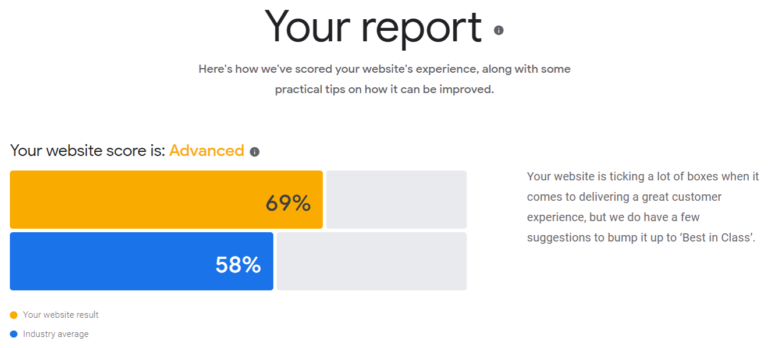

One part of the report looked at product information.
It said, “We couldn’t easily find ratings and reviews. Make these stand out to encourage potential customers to buy from you.”
And it added, “36% of Apparel retailers pass this part of the report.”
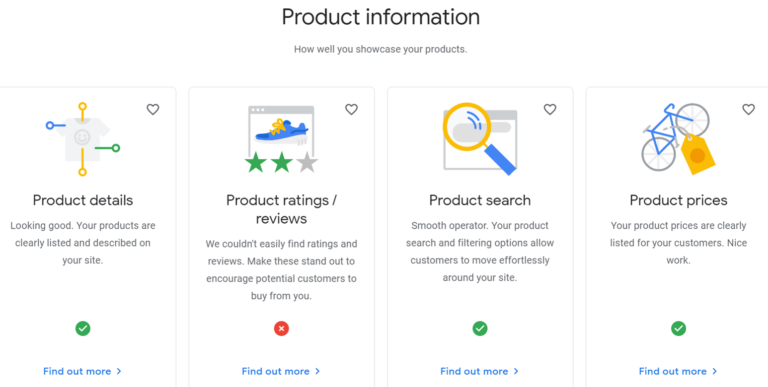

Another part of the report checked for flexible fulfillment.
It said, “Highlight your Next Day Delivery option. Add any additional charge details, so customers can make an informed decision.”
And it added, “You haven’t passed this part of the test, but you’re not alone. On average, most Apparel retailers fail.”
This part of the report also said, “Having a free returns policy that’s easy to find on the site will help save your customers a lot of stress.”
And it added, “25% of Apparel retailers pass this part of the report.”
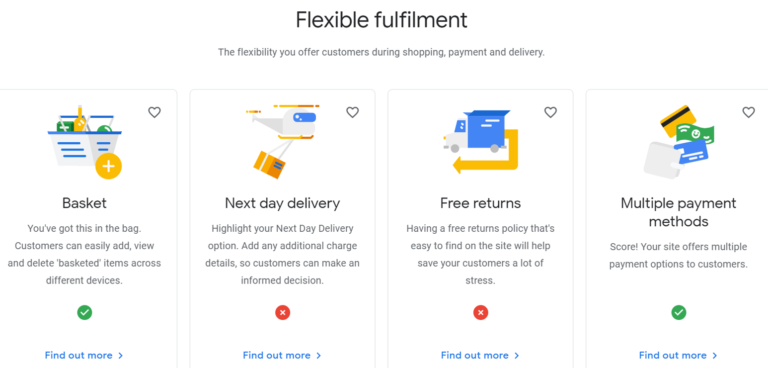

A third part of the report examined customer service.
It said, “Including a chat box allows customers to ask additional questions when they need to. We couldn’t find one on your site.”
And it added, “You haven’t passed this part of the test, but you’re not alone. On average, most Apparel retailers fail.”
This part of the report also said, “Help customers engage with you across different channels – have at least two active social media accounts on your site.”
It also added, “91% of Apparel retailers pass this part of the report.”
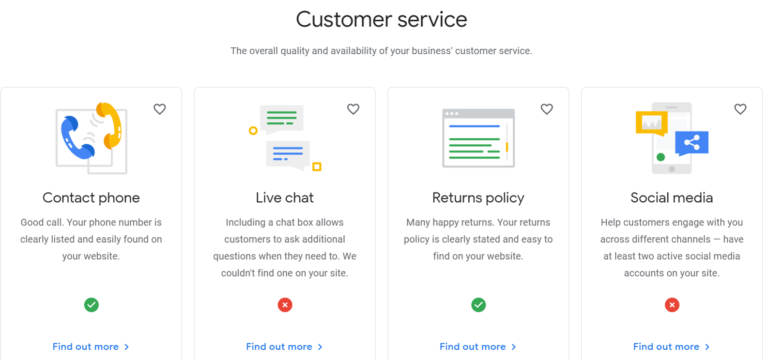

A fourth part of the report analyzed how mobile-friendly the website is.
It said, “According to our test, your page loading speed seems a little slow.” And it added, “You haven’t passed this part of the test, but you’re not alone. On average, most Apparel retailers fail.”
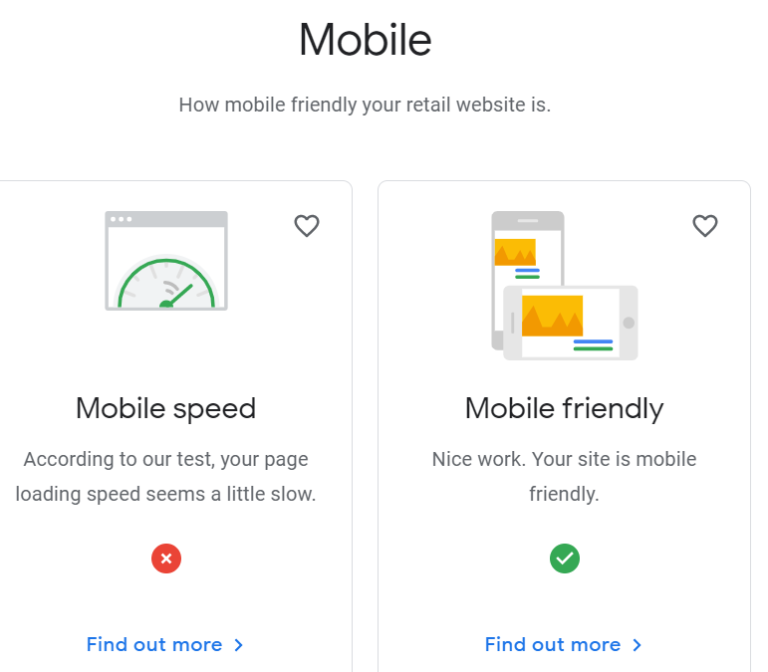

Now, the information and recommendations generated by this tool are intended as guidelines only.
But, they focus on the items that might be covered in an SEO audit.
And prioritizing the most relevant ones may help SEO pros improve their website’s user experience, which will become even more important when Google rolls out its Page Experience Update in 2021.
3. Provide High-Quality Content on Your Pages to Give Visitors the Information They’re Looking For
The third and final step in this advanced SEO process is “provide high-quality content on your pages, especially your homepage,” according to Google. “This is the single most important thing to do.”
“If your pages contain useful information, their content will attract many visitors and entice webmasters to link to your site,” the search engine adds.
Ummm, OK.
So, how do marketers and SEO professionals do that?
Well, on a strategic level, all of us need to pay more attention to trends and less attention to events.
In other words, we should spend less time trying to see things as they are and asking “Why?” and more time dreaming of things that never were and asking, “Why not?”
If they apply this strategic insight to the Google Merchandise Store, then we will lose less sleep trying to figure out why no one searches for items like the “Google fanny pack” anymore.
Instead, we’ll want to spend every waking hour trying to dream up new categories of merchandise like:
- Google Calendar and planner for algorithm updates.
- Google Cardboard coffee cup sleeves and coasters.
- Google Classroom face masks and hand sanitizer.
- Google Cloud raincoat and umbrella set for kids.
- Google Gnome for voice-activated backyard living.
- Google Maps and wall décor for the home office.
- Google Panda and Penguin giant stuffed animals.
- Google Sheets and pillowcases for the guest room.
- Google Workspace pens, notebooks, and drinkware.
- YouTube Shorts and unisex joggers for online meetings.
On a tactical level, it won’t be hard for the Google Merchandise Store to find examples of websites that provide high-quality content on their pages that also give visitors the information they’re looking for.
As a matter of fact, they’re hidden in plain sight.
For example, what do you see when you look at the page in Google Analytics Help about “Getting started with Analytics”?
You see an embedded YouTube video titled, Google Analytics: First Steps.
Now, what do you see when you scroll to the bottom of the page about Google Search Console tools?
There are four YouTube videos about training with a link below them for even “more videos.”
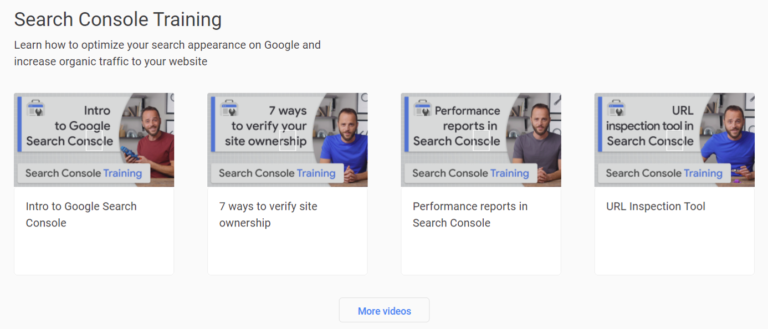

Now, look at the top of the page in the Search Console Help Center about Webmaster Guidelines and tell me what you see.
It’s an embedded YouTube video called Webspam Content Violations.
Scroll down the page and you will see a second embedded YouTube video entitled, Does Google take manual action on webspam?
Although the vast majority of SEO professionals have likely visited these pages before, most still have not embedded high-quality video content on the pages of their own websites to give visitors relevant and useful information that they’re looking for.
So, Google’s embedded YouTube videos seem to be hidden in plain sight.
And, if you think that I’ve cherry-picked these examples, then it’s worth noting that Google and YouTube have 51 different YouTube channels and they’ve uploaded 906 videos in just the last 90 days.
As SEO pros begin preparing for Google’s Page Experience update in 2021, which will measure aspects of how users perceive the experience of interacting with a webpage, it’s worth knowing that there are many types of videos that could be embedded on a page.
This includes:
- Customer testimonials.
- Product announcements.
- How-to tutorials.
- Executive profile videos.
- Event videos.
- Social media tips.
- Press release supplements.
Even for a typical ecommerce site like the Google Merchandise Store, it may be more rewarding to show products in a setting – like an engineer carrying a Google bag or an influencer wearing a YouTube T-shirt – than just another photo of an individual product.
I realize that these aren’t the typical issues that technical SEO professionals wrestled with back in 2001.
But these are the advanced SEO concepts and techniques that will make or break their careers in 2021.
And don’t blame Google for making you live in interesting times.
If you need a second opinion, just check out the video, The whole working-from-home thing — Apple.
Uploaded to YouTube on June 13, 2020, it currently has more than 27.9 million views and 165,000 engagements.
Yeah, 2020 has been a year unlike any other.
But, this underscores a trend before the global pandemic hit mentioned in the article, YouTube’s Organic Visibility Tops Wikipedia in Google SERPs.
“YouTube has steadily (and stealthily) increased its organic visibility in Google’s SERPs over the past two years and recently surpassed Wikipedia for the #1 spot.”
So, I Googled the phrase “the whole working from home thing” and saw lots of videos in the SERP, as you can see in the image below.
Apple’s video not only appears in the video carousel at the top of the page, but it is also the #1 organic search result – along with a thumbnail image of Apple’s video.
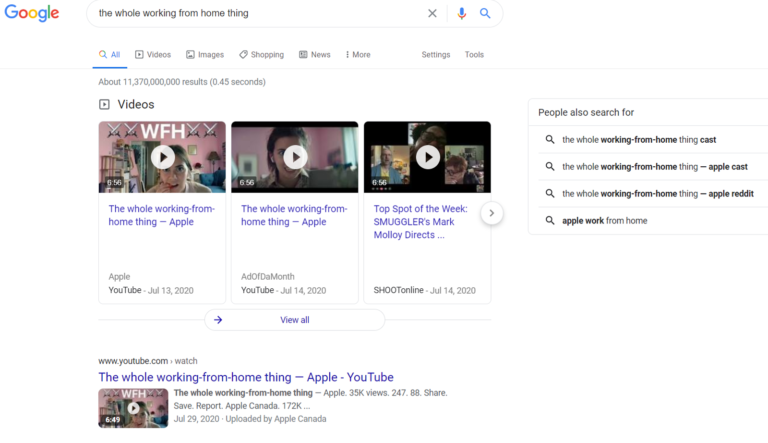

This is another example of why we need to pay more attention to trends and less to events.
If you think that this year upended our daily lives and routines, wait until you see what comes next.
We’re all traveling in truly uncharted territory.
More Resources:
- Paving the Path Forward with SEO: Preparing for New Normalities
- How to Future-Proof Your Brand with the Help of SEO
- SEO for Beginners: An Introduction to SEO Basics
Image Credits
All screenshots taken by the author, October 2020
Sorry, the comment form is closed at this time.